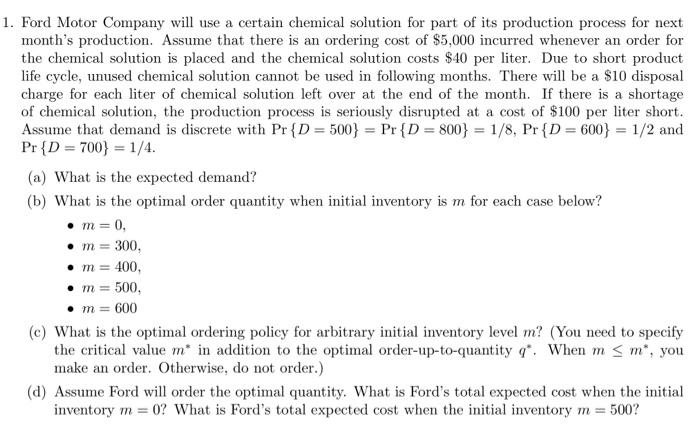1. Ford Motor Company will use a certain chemical solution for part of its production process for next month's production. Assume that there is an ordering cost of $5,000 incurred whenever an order for the chemical solution is placed and the chemical solution costs $40 per liter. Due to short product life cycle, unused chemical solution cannot be used in following months. There will be a $10 disposal charge for each liter of chemical solution left over at the end of the month. If there is a shortage of chemical solution, the production process is seriously disrupted at a cost of $100 per liter short. Assume that demand is discrete with Pr{D = 500} = Pr{D = 800} = 1/8, Pr{D = 600} = 1/2 and Pr{D = 700) = 1/4 (a) What is the expected demand? (b) What is the optimal order quantity when initial inventory is m for each case below? m = 0, 300, m = 400, m = 500, m = 600 (c) What is the optimal ordering policy for arbitrary initial inventory level m? (You need to specify the critical value m* in addition to the optimal order-up-to-quantity q*. When msm*, you make an order. Otherwise, do not order.) (d) Assume Ford will order the optimal quantity. What is Ford's total expected cost when the initial inventory m=0? What is Ford's total expected cost when the initial inventory m = 500? ms 1. Ford Motor Company will use a certain chemical solution for part of its production process for next month's production. Assume that there is an ordering cost of $5,000 incurred whenever an order for the chemical solution is placed and the chemical solution costs $40 per liter. Due to short product life cycle, unused chemical solution cannot be used in following months. There will be a $10 disposal charge for each liter of chemical solution left over at the end of the month. If there is a shortage of chemical solution, the production process is seriously disrupted at a cost of $100 per liter short. Assume that demand is discrete with Pr{D = 500} = Pr{D = 800} = 1/8, Pr{D = 600} = 1/2 and Pr{D = 700) = 1/4 (a) What is the expected demand? (b) What is the optimal order quantity when initial inventory is m for each case below? m = 0, 300, m = 400, m = 500, m = 600 (c) What is the optimal ordering policy for arbitrary initial inventory level m? (You need to specify the critical value m* in addition to the optimal order-up-to-quantity q*. When msm*, you make an order. Otherwise, do not order.) (d) Assume Ford will order the optimal quantity. What is Ford's total expected cost when the initial inventory m=0? What is Ford's total expected cost when the initial inventory m = 500? ms







